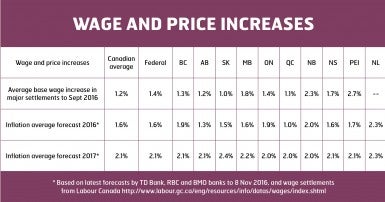
Base wage increases in large collective agreements settled during the first nine months of 2016 averaged just 1.2 per cent and just 0.6 per cent in the first year of these agreements. These increases are considerably below consumer price inflation not only for the current year but also for the 52-month average duration of these agreements.
Other measures of wage increases aren’t much better: Statistics Canada’s payroll survey shows a 1.3 per cent increase in hourly wages and just 0.7 per cent for average weekly earnings so far this year. If the averages remain this low for the rest of the year, they’ll match the lowest increases on record since the early 1980s.
|
Wage and price increases |
Canadian average |
Federal |
BC |
AB |
SK |
MB |
ON |
QC |
NB |
NS |
PEI |
NL |
|
Average base wage increase in major settlements to Sept 2016 |
1.2% |
1.4% |
1.3% |
1.2% |
1.0% |
1.8% |
1.4% |
1.1% |
2.3% |
1.7% |
2.7% |
– |
|
2016 Inflation average forecast* |
1.6% |
1.6% |
1.9% |
1.3% |
1.5% |
1.6% |
1.9% |
1.0% |
2.0% |
1.6% |
1.7% |
2.3% |
|
2017 Inflation average forecast* |
2.1% |
2.1% |
2.1% |
2.1% |
2.4% |
2.2% |
2.0% |
2.0% |
2.0% |
2.1% |
2.1% |
2.3% |
* Based on latest forecasts by TD Bank, RBC and BMO banks to 8 Nov 2016, and wage settlements from Labour Canada http://www.labour.gc.ca/eng/resources/info/datas/wages/index.shtml
Federal and provincial governments have continued to suppress wage increases through austerity, imposed wage settlements and policies that undermine the creation of good jobs. Lower settlements for public sector and unionized workers generally mean lower wage increases for private sector and non-unionized workers as well.
Increasing foreign investment and using private financing for public infrastructure won’t do much to strengthen the economy. Instead we need to create more demand through public and household spending—and for that we need stronger wage growth.



